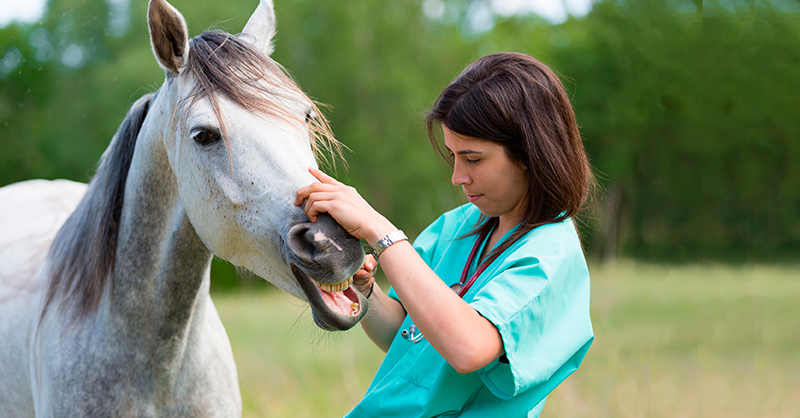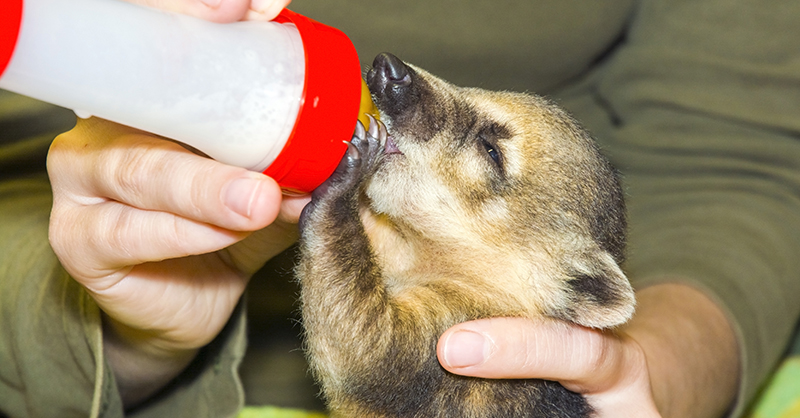When you think about health care, does your mind automatically conjure images of caring for humans? While there are many careers in this field that focus on promoting human patients’ wellness, the animal lovers among us will be happy to know there are quite a few options for caring for animals, too.
These opportunities extend beyond just domesticated animals. Yes, dogs may be “man’s best friend,” but animals of all shapes and sizes require care from knowledgeable experts in a safe environment. From immunizations to emergency services, the tasks for health care professionals who care for animals — and the species of the patients who receive their care — are varied.
Veterinarians help creatures big and small
Veterinarians prevent and treat medical concerns, including obesity, arthritis and chronic illness. In small animal practices, pet obesity is an increasing concern — in fact, 1 in 3 dogs and cats are overweight because of overfeeding, decreased exercise, genetics, other diseases and/or the lack of acknowledgment of the animal’s condition by their owner. A vet can help his or her patients’ owners learn what they need to know to support a healthier lifestyle.
There are opportunities for vets beyond small animal practices as well. Large animal vets manage the health care of livestock, to include cattle, horses, sheep, goats and pigs. They often make house calls to farms or factories to conduct routine health care tasks like immunizations, taking ultrasounds or x-rays, to tend wounds and to perform surgeries.
Veterinarian assistants are an asset to the vet clinic
Just as medical assistants help physicians with patient care, vet assistants support vets as they provide care. This position is a great fit for those interested in studying to become a vet later on, as climbing the career ladder is one of the best ways to gain experience in the health care field.
On-the-job training is the most common form of education for vet assistants, and typical tasks include feeding animals, administering medications and monitoring patients after surgery. According to the Bureau of Labor Statistics, the growth rate for this position is expected to be 14% by the year 2020, making it a great option for part-time work while attending medical school.
Veterinary technologists and technicians put tech to work
Vet technologists and technicians perform tasks somewhat similar to those performed by medical technicians, just in a different environment and with a different type of patient. They perform the diagnostic tests on animals, like x-rays or ultrasounds, and collect samples for testing. The difference between a technologist and technician comes down to the amount of schooling — technologists hold a four-year degree. Vet techs work in a variety of environments, which can include spending 9-to-5 in a small, quiet office or might involve making house calls with a large animal vet. For those who are looking for a flexible, never-boring job with room for advancement, vet tech is a great career to consider.
Animal behaviorists observe and ask why
Just as many types of doctors take into consideration more than just physical health when caring for people, animal behaviorists study what causes certain behaviors and what contributes to changes in those behaviors. They ask questions and observe closely to find answers. Animal behaviorists often specialize in a particular species. Is there a certain species that intrigues you? You could dedicate your work to learning more about their appetites, hormones, illnesses, mating practices and how they raise their offspring.
The basis of the study of animal behaviors stems from a Dutch biologist and ornithologist, Niko Tinbergen. Tinbergen asked questions regarding function, evolutionary history and developmental trajectory of an animal’s behavior. There are some behaviorists who specialize in how animals interact with people. These specialists are mostly focused on changing the behavior of an animal in some way.
Zookeeping offers a gateway to a career in animal health care
Zookeeper as a health care career? We don’t blame you for wondering how this made the health care career list! Zookeepers complete various tasks, which can include educating the public and cleaning animals’ habitats, but many are also responsible for monitoring and reporting on signs of injury or illness. Generally, a degree in animal science or biology is required for this career choice. Similar to getting your start as a vet assistant, zookeeping can be a great way to get started working with animals to see if you want to continue down this health care path.
Many zoos offer internships to help students learn about the career and give them a boost when it comes to job hunting after graduation. Not all internships are paid, but even unpaid internships can offer unique value as you choose a career. Consider the region or animal in which you’d be most interested in working and see if a local zoo has an internship program available.
If you enjoy problem solving, continuous learning and a variety of career options, then a health care career focused on taking care of animals just may be the perfect fit for you.



Comment:
I didn’t know that there are large animal vet practices. My daughter loves animals and wants to become a veterinarian when she grows up. I’ll have to be sure she knows about the need for getting an education and interning first.